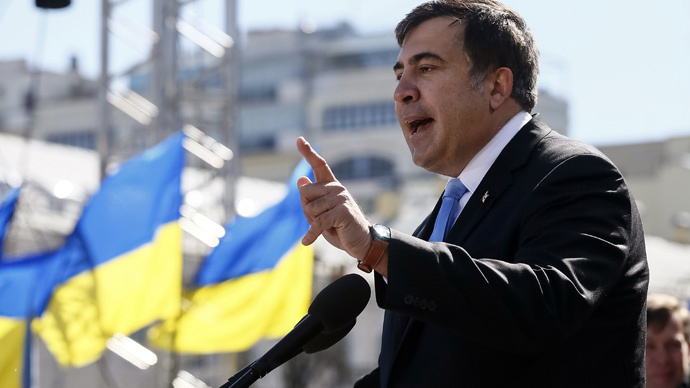
Mikheil Saakashvili Appointed Governor of Ukraine’s Odesa Province (Part One)
Publication: Eurasia Daily Monitor Volume: 12 Issue: 102
By:

On May 30, Ukrainian President Petro Poroshenko appointed Mikheil Saakashvili, former president of Georgia, as chairman of the state administration (governor) of Ukraine’s Odesa province. On the preceding day, Poroshenko conferred Ukrainian citizenship to Saakashvili “as a matter of national interest of Ukraine.” The cabinet of ministers under Arseniy Yatsenyuk endorsed Saakashvili’s appointment (President.gov.ua, May 29, 30).
Saakashvili thereby joins the phalanx of Georgian officials and experts currently working for the Ukrainian government. They had earlier served during the Saakashvili administration (2004–2012), when Georgia was recognized as the most successfully reforming country in Europe’s East, until the regime reversal in that country. Ukraine is now drawing on their experience.
Saakashvili’s mandate as state administration chairman (governor) entails multiple, daunting tasks. Odesa is one of Ukraine’s most complicated provinces, by any criteria. There, the reform agenda and the security agenda are more closely inter-related than almost anywhere else in Ukraine.
Odesa was the epicenter of Russia’s 2014 Novorossiya project in its initial form, which envisaged cutting off Ukraine from its main seaport, opening a Russian corridor via Odesa to Transnistria, and carving out a Russian-controlled territory abutting directly on Moldova and Romania (see EDM, May 27, 2014). Pro-Russia groups narrowly failed to seize control of the city in May 2014. Some remnants of those groups are still active, although increasingly outnumbered by committed pro-Ukraine civic groups. The latter range from the patriotic-liberal to the far right. Political subversion with occasional low-level violence by the pro-Russia element continues to date in the city, but is being contained by the authorities, while the countryside seems tranquil.
The Odesa province (population 2.4 million, including the Odesa municipality with slightly more than one million) is Ukraine’s most diverse in terms of ethnic composition. However, linguistic russification runs deep and cuts across the ethnic lines. The impact of Russian mass media is stronger than that of Ukraine’s central media. Ukrainian security services have recently nipped in the bud a Moscow-inspired attempt to create a multi-ethnic “national-cultural autonomy of Bessarabia” in that part of the Odesa province. The ethnic communities’ official leaders displayed loyalty to Ukraine, distancing themselves from that attempt (see EDM, April 9, 13, 14).
Direct proximity to Transnistria, where Russian troops are based, poses further challenges in the Odesa province. The military and law enforcement authorities have redoubled efforts to prevent infiltration of agents and arms from Transnistria into Ukrainian territory, across a 400-kilometer border (technically the Moldova-Ukraine border, controlled by Transnistria on what is legally the Moldovan side).
Political authority is deeply fragmented and intertwined with business clans in the Odesa province. The overall picture has been compared with an intractable Gordian Knot, which some observers now expect “Saakashvili to cut with his sword” (Interfax-Ukraine, May 31).
Saakashvili replaces Ihor Palytsia as chairman of the Odesa province state administration. President Poroshenko released Palytsia on the same day when appointing Saakashvili (May 30). This move must be seen in the context of Poroshenko’s recently launched effort of “de-oligarchization” of Ukrainian politics. Palytsia, a native of Volyn province, was a manager of oil and petrochemical firms controlled by the billionaire businessman Ihor Kolomoysky, and was appointed chairman of the Odesa province state administration in May 2014. Palytsia owed the appointment to Kolomoysky, who was the Dnipropetrovsk province state administration chairman and wielded strong political influence in Kyiv, including in the Poroshenko Bloc at that time. In March 2015, however, Poroshenko initiated the de-oligarchization policy by dismissing Kolomoysky from his Dnipetropetrovsk post, while the Verkhovna Rada passed legislation curtailing Kolomoysky’s blocking powers as a shareholder in the majority-state-owned Ukrnafta company. The release of Palytsia from his Odesa post was bound to follow.
Odesa province used to be a stronghold of the Party of Regions until the latter collapsed in early 2014. Remnants of that party are still influential in the elected authority, the Provincial Council. The current council chairman, Mykhaylo Shmushkovych, belonged to the Party of Regions until 2014, but has distanced himself from that legacy (as did his immediate predecessor, Oleksiy Honcharenko, who left the Party of Regions and is currently a parliamentary deputy in Kyiv with the Petro Poroshenko Bloc). Another politician from the Party of Regions, Hennady Trukhanov (formerly a Soviet army officer) was elected mayor of the city of Odesa in May 2014 (shortly after the failed attempt by pro-Russia groups to seize the city). Offshoots of the former Party of Regions (the Opposition Bloc and others) prevailed in the October 2014 parliamentary elections in the Odesa province. However, Petro Poroshenko took a distant first place with 42 percent of the votes cast in the Odesa province in the May 2014 presidential election (see EDM, May 30, 2014).




